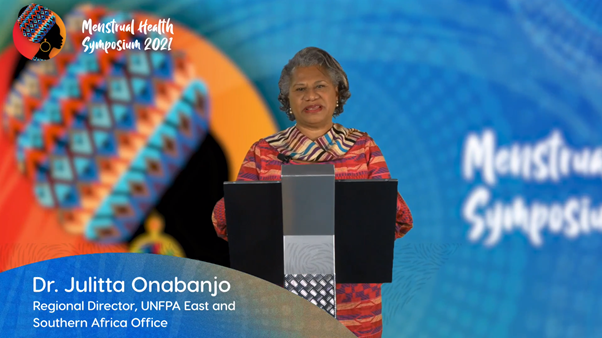Menstrual, sexual, and reproductive health
in the region reveals dire inequalities
JOHANNESBURG, South Africa, 3 June 2021 — The Africa Coalition Symposium on Menstrual Health saw the renewal of commitment to further improve menstrual, sexual, and reproductive health and rights in Africa.
The event, organized by the African Coalition on Menstrual Health Management (ACMHM) with UNFPA, the United Nations sexual and reproductive health agency, recognized progress from the first symposium in 2018 with menstrual health policies rolled out across the continent.
However, most of the 400 million women and girls of reproductive age, and the 300 million who menstruate are still unable to manage their menstrual health in a safe, hygienic, and dignified manner. Many still experience shame, indignity, depression, and ill health during menstruation.
More than 90 experts shared their research findings and experience during the symposium and called for renewed commitments and accelerated action to improve menstrual health in Africa.
The high-level opening session featured President of Ethiopia, Sahle-Work Zewde; the First Lady of Malawi, Monica Chakwera; UNFPA’s Deputy Executive Director for Programme; Diene Keita; and Mr. Robert Kampala, Regional Director of WaterAid representing the leadership of the ACMHM.
President Sahle-Work Zewde said, “Promoting menstrual health is not only a health and sanitation matter, but also a crucial step towards safeguarding the dignity, integrity and overall life opportunities for women and girls.”
People-centered, multi-sectoral approach
The symposium identified good practices and innovative solutions on improving menstrual health and integrating into Sexual and Reproductive Health and Rights (SRHR) policies and programmes, and sustainable financing towards universal access to menstrual health information, products, and services.

Dr. Julitta Onabanjo, UNFPA Regional Director for East and Southern Africa, launched the UNFPA’s technical brief to guide policymakers and programme managers on how to integrate menstrual health into SRHR policies and programmes across multiple sectors.
In Africa, there has been impressive policy shifts such as tax exemption for menstrual products to reduce period poverty. However, significant gaps still exist to ensure access to menstrual health information, products, and services.
Additionally, the symposium emphasized the urgent need to use the comprehensive definition of Menstrual Health, published by the Global Menstrual Collective, which fully acknowledges menstrual health as a human right.
The symposium also highlighted the role of men and boys for improved menstrual health and using people-centered multi-sectoral approaches through the lens of the life cycle. Traditional and religious leaders had a role to eliminate stigma and harmful and discriminatory practices around menstruation. In addition, the symposium brought to light the importance of programmes addressing the sexual and reproductive health needs of young people, particularly on expansion of comprehensive sexuality education. Moreover, the event called for attention to women, girls and people in emergency and humanitarian crises, and the impact of COVID-19 on menstrual health services.
Renewed commitment
The symposium adopted A Renewed Call to Action to strengthen commitments to respond effectively to the menstrual health needs of women, girls and all people who menstruate throughout the reproductive life cycle, and to leave no one behind.
Dr. Julitta Onabanjo concluded by saying, “We need to redouble our efforts to increase external as well as domestic financing by developing costing models, investment cases and using innovative financing instruments.” She added, “Situating menstrual, sexual and reproductive health within country-specific Universal Health Coverage policy, financing, delivery and financial protection arrangements will not only improve sustainable financing for menstrual, sexual and reproductive health but also accelerate progress towards universal access to menstrual, sexual and reproductive health information, products and services.”
For more information, or to view presentations made at the symposium, go to: https://acmhm.org/
To request interviews, contact:
Daisy Leoncio, leoncio@unfpa.org, WhatsApp: +1 347 491 9154
Lindsay Barnes, barnes@unfpa.org, WhatsApp: +27 83 277 3257
++++
ACMHM
The African Coalition on Menstrual Health Management strengthens coordination among key stakeholders to build on and support the evidence to better transition research into action. It is a collaborative partnership of practitioners working on menstrual health, public health, and sexual and reproductive health and rights in Africa. It consists of nearly 600 experts working in or interested in menstrual health issues, policy makers, young people, social entrepreneurs, civil society organizations and individuals.
UNFPA
UNFPA, the United Nations sexual and reproductive health agency, delivers a world where every pregnancy is wanted, every childbirth is safe and every young person's potential is fulfilled. UNFPA calls for the realization of reproductive rights for all and supports access to a wide range of sexual and reproductive health services, including voluntary family planning, maternal health care and comprehensive sexuality education.



